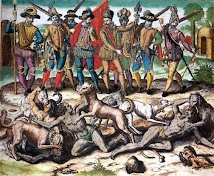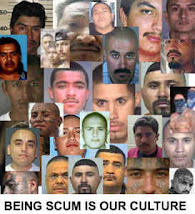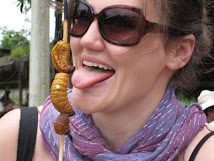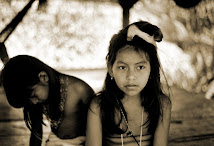
Monday, May 25, 2009
Latina hookers in queens....

Sunday, May 24, 2009
Illegal hispanics life in usa....


Monday, May 18, 2009
Dominican Prostitutes, Facing AIDS Crisis, Test Experimental Vaccine
.jpg)
The Dominican Republic is among eight countries where Merck & Co. is testing an experimental HIV vaccine composed of deactivated cold viruses and synthetically produced HIV genes. One hundred seventy-five Dominican prostitutes are taking part in the Phase II trial, which is expected to last four years. Other test sites include Haiti, Brazil, Jamaica, Australia, Canada, Peru, and the United States.
The Caribbean region has an AIDS rate second only to that of sub-Saharan Africa. UN figures show nearly three-quarters of those with HIV/AIDS in the region live on Hispaniola, the island the Dominican Republic shares with Haiti. Around 3.6 percent of Dominican prostitutes are infected, although researchers say rates are as high as 12 percent in certain areas.
The prostitutes, who were recruited from brothels across the country, will travel to Santo Domingo during the trial's first seven months to receive three injections. They must return for regular follow-ups during the study's four-year period. The study pays for the women's meals and transportation, and it provides them with $30 for a lost day's wages. In addition to health training, an occasional gift bag of cosmetics is given to keep the women from losing interest.
The HIV strain found in the eight Merck vaccine trial sites is the same one common in Europe. A new trial in South Africa will determine whether the vaccine candidate is effective on African strains. The Merck trial is one of 17 being sponsored by the Seattle-based HIV Vaccine Trials Network, which is supported by the US government.
Sunday, May 17, 2009
Hispanic NYPD Officers Charged With Rape

Friday, May 15, 2009
Hispanic female offers her daughter to a chinese massage custumers in NYC
Wednesday, May 13, 2009
AIDS among Latinos the next health crisis
Though Hispanics comprise about 14 percent of the U.S. population, they represented 22 percent of new HIV and AIDS diagnoses tallied by federal officials in 2006. According to a survey by the Kaiser Family Foundation, Hispanics in Washington, D.C., have the highest rate of new AIDS cases in the country.
So far, the toll of AIDS in the nation’s largest and fastest growing minority population has mostly been overshadowed by the epidemic among African Americans and gay white men. Yet in major U.S. cities, as many as 1 in 4 gay Hispanic men has HIV, a rate on par with sub-Saharan Africa.
Blacks still have the highest HIV rates in the country, but language difficulties, cultural barriers and, in many cases, issues of legal status make the threat in the Hispanic community unique. For those who arrived illegally, in particular, fear of arrest and deportation presents a daunting obstacle to seeking diagnosis and treatment.
“Officials need to stop downplaying or ignoring what’s happening among Latinos,” said Oscar De La O, president of Bienestar, a Latino service organization. “We are at the center of the storm.”
Even with the United States embroiled in a fierce debate over immigration policy, the problem of AIDS in Latinos had received scant attention from political and public health officials. At the Centers for Disease Control and Prevention, where only 2 of 17 approved HIV programs target Hispanic Americans, officials have added Spanish-language hotlines, confidential testing sites and other initiatives aimed at filling the gap.
“Hispanics are overrepresented in this epidemic, and we need to target our efforts to them,” CDC epidemiologist Kenneth Dominguez said in an interview.
Officials do not have a precise tally of HIV infection nationwide, because many states have not reported figures to the CDC. The 22 percent, a figure that has not been previously released, includes 33 states and Puerto Rico, but not California, where more than 37 percent of the population is Hispanic.
“You combine the economic pressures, loneliness and immigration worries, and it pushes these individuals to be a hidden population,” said Frank Galvan, of the Charles Drew University of Medicine and Science in Los Angeles.
The consequences, however, go well beyond the Hispanic community. If the United States does not begin to “make a dent” in the swelling crisis of HIV among Hispanics, Galvan said, “it will continue to spread to other populations.”
The nexus of AIDS and migration — the reality that viruses know no borders — will gain fresh prominence at the International AIDS Conference next month in Mexico City. It is a nexus that plays out in dramatic fashion in San Ysidro and other communities along the U.S.-Mexican border, where the tensions associated with immigration tend to exacerbate an already stigmatized illness.
“Migrants tend to be lonely, separated from their family or partners,” Dominguez said. “They do not have health insurance. They may turn to drugs or alcohol. All of these put a migrant at higher risk.”
Mauro Ruiz’s story fit that profile.
Growing up gay in Mexico, the 35-year old felt the pain of his family’s shame. He fled north of the border, as many do, in search of a better life. There, he thought, he could live openly and thrive.
Unleashed from the stigma that cloaks homosexuality in Mexico’s conservative, machismo culture, Ruiz sought refuge in San Diego’s gay bars and bathhouses. There, he discovered friendly American men and crystal methamphetamine.
“I had no idea meth was so addictive,” he said. “It takes away your inhibitions. I started associating with people I wouldn’t normally.”
It was not long before Ruiz contracted HIV. Like many Latinos, his disease had nearly reached full-blown AIDS before it was diagnosed. “I was scared as hell, really, really afraid,” he said in a near-whisper.
Saturday, May 9, 2009
In Latin America, Abuse by Priests Hidden in Shadows
Even as hundreds of priests and bishops from the U.S. to Poland have been implicated in the abuse of children, only a handful of cases have come to light in a population that accounts for about 30% of the world's Roman Catholics.
The church's power, the region's bankrupt judicial systems and a culture that abhors homosexuality have combined to create enormous barriers to claims of priestly abuse, experts say.
Few doubt that such abuses occur in Latin America with the more frequency as in other parts of the world. And here, they appear to be easier to conceal.
"Here, priests are sacred, almost godlike. They have total power. No common person is going to take them to court," said Sergio Bran, a sociologist at the University of Central America in El Salvador who has long studied the Roman Catholic Church.
At an outdoor Mass in Toronto on Sunday, the pope told hundreds of thousands of followers that ''the harm done ... to the young and vulnerable fills us all with a deep sense of sadness and shame.''
Individual cases have been reported in ecuador, panam, dominican republic, Bolivia, Colombia and Venezuela. 30 priests have been sued in connection with alleged pedophilia incidents. And former students have long accused a papal ally in Mexico of repeated abuses. The Rev. Marcial Maciel, founder of a conservative order known as the Legion of Christ, has vehemently denied the accusations.
Here in this booming suburb of factory workers and fast-food chains, it took a most uncommon man to bring to light one of the few known cases of pedophilia in Central America.
Tuesday, May 5, 2009
NYC school bus pedophile finally convicted


In March 2007, Rodolfo Hernandez,(a spic male's name, surprised?) a 52-year-old school bus driver, was transporting a three-year-old Staten Island girl with special needs back home after a day at Little Lamb Preschool. Mr. Hernandez told the matron on the bus to go home. He could take it from here. The matron got off the bus, leaving Carmen alone with the man who would be convicted of sexually molesting her two years later.
The child had a speech delay, and prosecutors said that Mr. Hernandez relied upon her disability to sexually abuse her and get away with it. And that is almost what happened.
While Carmen was able to convey the sex abuse to her parents through gestures and single words, the child could not tell detectives or child psychologists what had happened that day on the bus. The matron denied ever having left the bus, because she knew she would get fired if she told the truth. With no evidence and no witnesses except a special needs three-year-old, police released Mr. Hernandez without charging him. But they did retrieve, a day later, the little girl’s underwear from the family hamper and sent it off for DNA testing.
For the next year, Mr. Hernandez, who had twice been convicted of DUI, drove a school bus full of special-needs children every day.
In March 2008, when the DNA testing came back from the lab and the pedophile’s saliva was found inside poor Carmen’s underwear, Mr. Hernandez was charged and jailed while awaiting trial. Another interview with the bus matron revealed that she lied to detectives about being on the bus when the toddler said she had been abused.
The trial began a full year after the arrest, and yesterday Mr. Hernandez was convicted of first-degree sexual abuse and endangering the welfare of a minor. He faces a sentence of two to seven years on March 30.
It took two full years, but the parents of Carmen finally got the pedophile off the streets and out of the school buses of special needs children. Who knows how many children he molested before he got caught? That is the unsettling question for parents of special needs children everywhere.
The Department of Education needs more oversight of their school bus personnel. Right now, they contract out bus service to the lowest bidders, and special education children find themselves spending up to three hours a day with drivers and matrons who have no training in special needs nor any desire to help special needs children. They are simply people getting paid minimum wage to do a job that no one else wants. It is not surprising that many of them end up taking advantage of their young charges.
We hear of many stories that run the gamut from terrifyingly dangerous to incredibly insensitive. My special needs daughter spent an entire year with a matron who didn’t know how to strap a child in a car seat. I heard a story where a child had an “accident” on the bus and the matron made the mother board the bus with a mop and pail and clean it up. Matrons are supposed to be the female guardians of these buses, but many buses run without them or with ones who are present but ambivalent.
Drivers and matrons of special education buses need more vetting, training and oversight. How many special needs children need to be harmed before Chancellor Klein makes good on his slogan Children First?
Another reason to think Latinos are animals.
Swine flu and extermination of spics is a blessing for humanity....
Monday, May 4, 2009
Hispanic hookers....

Saturday, May 2, 2009
WHO to stop using term 'swine flu' to protect pigs




GENEVA – The World Health Organization announced Thursday it will would stop using the term "swine flu" to avoid confusion over the danger posed by pigs। The policy shift came a day after Egypt began slaughtering thousands of pigs in a misguided effort to prevent swine flu। WHO spokesman Dick Thompson said the agriculture industry and the U।N। food agency had expressed concerns that the term "swine flu" was misleading consumers and needlessly causing countries to ban pork products and order the slaughter of pigs। "Rather than calling this swine flu ... we're going to stick with the technical scientific name H1N1 influenza A," or just call it "Mexican flu"Thompson said.





































































.jpg)






.jpg)






